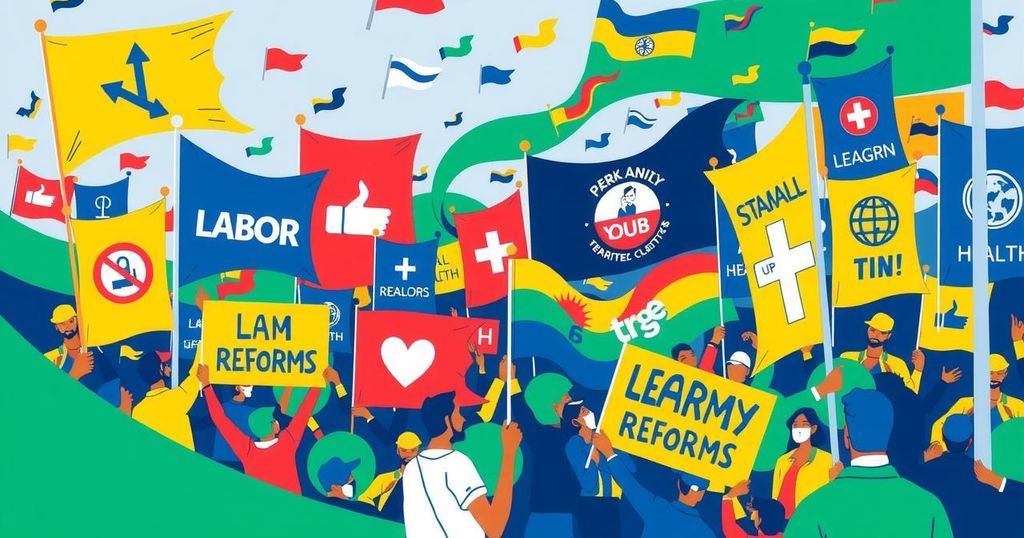Colombia’s President Pushes for Special Election on Key Reforms

Colombia’s President Gustavo Petro is pushing for a special election to approve stalled labor and health reforms, as his government faces significant legislative hurdles. During a rally, he criticized centrist and right-wing opposition, calling for public support. Despite logistical challenges, this election could mobilize his base ahead of elections next year.
President Gustavo Petro of Colombia has recently advocated for a special election to address stalled labor and health reform proposals. During a rally held on March 18, 2025, outside Congress in Bogotá, he called upon his supporters to challenge centrist and right-wing politicians who have hindered legislative advancement. The proposed plebiscite aims to allow voters to approve or reject key reforms that have not progressed due to political divisions.
In his passionate address, President Petro lamented that the Colombian populace has “made lots of sacrifices to be governed now by monarchs and tyrants.” He accused lawmakers of prioritizing corporate interests over the welfare of the people by bowing to “corruption and greed.” The rally coincided with a broader protest organized by labor unions, showing significant public backing for the special election initiative.
Petro’s Historical Pact coalition currently holds only a small minority of seats in the Senate, complicating his efforts to pass reform legislation. In a bid to boost turnout for the protests, he granted a holiday to national government workers. Thousands gathered in Bogotá’s Bolivar Square, amplifying the call to “punish” lawmakers opposed to his reforms, as he linked their actions to corporate influence and a lack of accountability.
The proposed special election, or popular consultation, requires Senate approval and mandates that roughly one-third of registered voters participate for its outcomes to take effect. Observers note that rallying enough electoral support to meet this threshold may pose a significant challenge, given that Petro received approximately 11.2 million votes in his presidential election.
Despite these challenges, some analysts view the special election as an opportunity for the government to galvanize support ahead of the congressional elections scheduled for March. Critics of the administration argue that Petro is attempting to deflect accountability for his struggles in Congress, using the reforms as a pivotal issue to secure another term in office.
Petro’s proposed health reforms aim to transform the existing system by dismantling insurance companies that manage obligatory payments, advocating for government management instead. However, legislators have consistently rejected this initiative, stressing concerns over excessive bureaucratic power and the government’s capacity to oversee vast patient numbers. His labor reform ambitions include increasing pay for nightshift workers and minimizing the use of short-term contracts, though critics assert such changes may inadvertently lead to higher unemployment.
The Colombian labor market is significantly characterized by informality, with over 55% of workers lacking formal contracts. Detractors of Petro’s proposals contend that the suggested regulatory changes may disincentivize companies from hiring these informal workers, thereby exacerbating employment issues in the country.
In conclusion, President Gustavo Petro’s call for a special election on labor and health reforms reflects a deeper struggle against political opposition within Congress. His rallying cry emphasizes the need for public support to overcome legislative stagnation. However, both the logistical and electoral challenges associated with this initiative could hinder its success. Ultimately, the outcome of this political maneuvering may impact the government’s ability to secure necessary reforms and galvanize support for future elections.
Original Source: apnews.com







